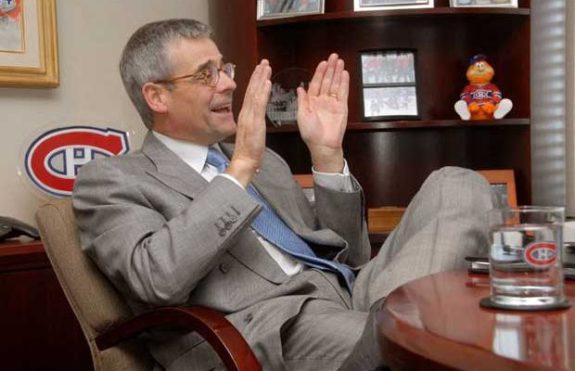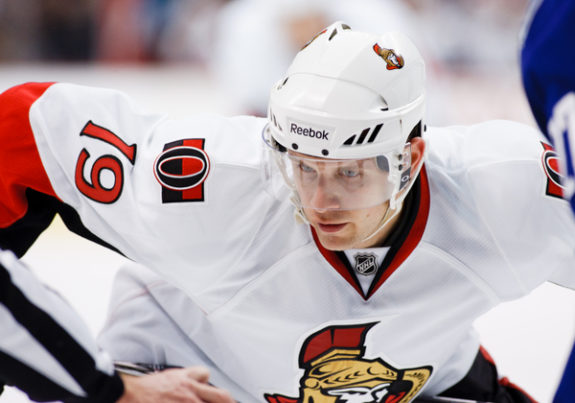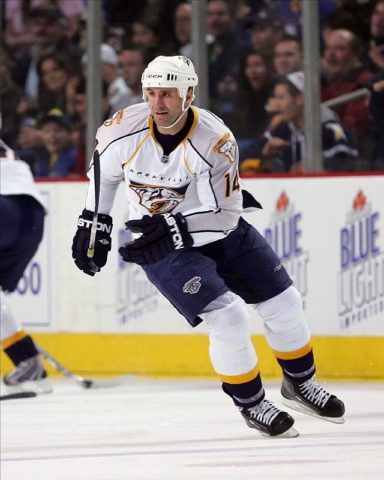It’s easy to forget about Radek Bonk’s tenure with the Ottawa Senators. After being one of the most hyped offensive prospects at the 1994 Draft, his decade with the franchise was disappointing. He was constantly overshadowed by bigger stars, forcing him out of the spotlight he had arrived in the city under, and eventually causing some to label him as a draft bust. When he was traded in 2004, Bonk was an afterthought, sold for the small price of a third-round pick.
Yet there were few players that were more important to the Senators’ development. After a decade with the team, Bonk sits sixth among Senators for all-time scoring with 399 points, and fifth among all-time games played with 689. He was a cornerstone for Ottawa, and his breakout in 1999-00 aligned almost perfectly with the Senators’ rise. Few players, past or present, can compare to the versatile power forward that was Bonk. He is truly the Senators’ forgotten star.

1994 NHL Entry Draft: the Top Pick Drops to Third
In 1993, Bonk left his home country of Czech Republic and joined the International Hockey League’s (IHL) Las Vegas Thunder. He already was a highly regarded prospect, putting up incredible numbers with Czech junior teams and making his debut in the Czech’s top league at just 17 years old. But when he arrived in Nevada, it was North America’s first up-close look at the forward, and everyone was eager to see how he would adapt to the smaller ice and rougher play style. He was, after all, the youngest player in the IHL, but also the first underage player to play professionally since Mark Messier in 1978. It was anyone’s guess how Bonk’s first season would go.
Bonk made the transition look easy. After 76 games, he had scored 42 goals, 87 points, and recorded 208 penalty minutes, earning him the IHL Rookie of the Year award in 1994, an honor shared with current NHL players Ed Belfour (1988) and Nelson Emerson (1991). Instantly, Bonk was the favourite to go first overall in that spring’s Entry Draft. Already 6-foot-4 and 215 pounds, he was clearly ready for the NHL, and it seemed that the sky was the limit for the teenager.
Not everyone was convinced, however. The Florida Panthers, who had the first overall pick, elected to go for Ed Jovanovski instead, as they were desperate for a franchise defenseman. He soon was considered the NHL’s premier prospect, so it’s hard to fault the Panthers here. But at pick number two, the Mighty Ducks of Anaheim also passed on Bonk and went with Oleg Tverdovsky, another defenseman. One possible reason was that Bonk’s agent Michael Barnett was notoriously tough, and Anaheim didn’t want to deal with him (from ‘Mighty Ducks Avoid Drafting Agents of Fortune’, The Los Angeles Times – June 29, 1994).
“I want to be number one and that is why I am doing everything. If they choose me number one, that is up to them. I cannot do anything about that. But I am trying to play the best I can, so they will choose me.”
Radek Bonk ahead of the 1994 Entry Draft (from ‘BONK MAY GO TO THE HEAD OF NHL DRAFT’, The Washington Post – June 19, 1994)
It seems strange that a team would pass on a player based solely on his representation, but the Ducks had just had a headache in bringing aboard Paul Kariya, their fourth-overall selection in 1993. He reportedly asked for $12 million over five years and held out over the 1993-94 season. Eventually, the two sides came to agreement around half the rumoured amount, but it wasn’t something the Ducks were eager to repeat any time soon. Thus the top-projected pick of the 1994 draft fell to the third selection, where the Senators jumped on the opportunity to land yet another top forward.
Contract Disputes and Early Struggles
Although the Senators were eager to bring their top pick aboard for the 1994-95 season, a few things stood in their way. Initially, Bonk was offered a three-year deal just over $1 million a season. However, Alexandre Daigle, the Senators’ 1993 first-overall pick, had just been given the richest rookie salary in league history at $12.25 million over five years, despite Ottawa being a cash-strapped team. After all the hype, Bonk’s agent believed he was owed more, so the deal was turned down in hopes of driving up the price.
Then the 1995 lockout hit, banning management from negotiating with players until a bargaining agreement was reached. While waiting for the NHL to resume operations, Bonk returned to the IHL but got off to an uncharacteristically slow start, scoring just 7 goals and 20 points in 33 games. There was no chance he’d make Daigle money now — the French superstar never scored below two points a game in junior — so when the 1994-95 NHL season began in January, Bonk quietly signed a deal that was less than the original offer. Once with the team, he continued to struggle, posting 11 points in 42 games, no doubt feeling the pressure after turning down the first deal.
Bonk’s second season with the Senators fared better. In 76 games, he scored 16 goal and 35 points, fifth highest on the team, and was selected to the Czech Republic’s World Championship team, where he won a gold medal, as well as the World Cup roster. But it was still a far cry from his lofty pre-draft status, and he knew it. His inconsistencies returned in 1996-97, scoring a measly 18 points in 53 games, then dropped to 16 in 65 games in 1997-98. Four years into his NHL career and barely 21 years old, Bonk’s future with Ottawa looked to be doomed.
1999-00: Pierre Gauthier and Bonk’s Breakout
It would be an understatement to say the Senators struggled in their early years. In their first four seasons in the league, Ottawa failed to win more than 18 games or place higher than dead last in the league. They’d also gone through general managers like tissues, employing three in their first three seasons. So, when Pierre Gautheir, who was working with the Ducks as the assistant GM, was hired midway through the 1995-96 season, no one could be blamed for expecting more of the same. However, Guathier had the exact skill set that was needed to turn around the hapless Senators.

One of his more notable team policies was to get rid of ‘vanity numbers’. That meant Bonk would be unable to wear his #76, which he’d had since his days in the Thunder, so he changed to #14 midway through 1997-98. After failing to reach the expectations placed on him and his draft position, the change seemed to give Bonk a new persona. In 1998-99, his first full season with his new number, he bounced back, tying his previous career high in goals of 16, which he set in his rookie season, as well as hitting the 30-point mark for the second time in his career.
Related: One for the Ages: Alexandre Daigle’s 2003-04 NHL Season
Another aspect that benefited Bonk was Gauthier’s decision to part ways with Daigle. After being heralded as the franchise’s saviour, Daigle had failed spectacularly to live up to the hype. His rookie season totals of 51 points were still his career high, and despite former managers continuing to herald him as the face of the franchise, popular opinion was beginning to sour on the brash, outspoken youngster. Still just 23 years old, he was shipped out to the Philadelphia Flyers for promising rookie Vaclav Prospal, a second-round pick and fellow draft bust Pat Falloon. With Daigle gone, Bonk was able to climb up the depth chart and take on some more ice time.
Gauthier unexpectedly stepped down at the end of 1998, citing family reasons, but the groundwork had been laid for Bonk to emerge. The final piece would come in 1999-00, when Alexei Yashin, who had been the team’s top scorer for the past three seasons, refused to report to the Senators unless his contract demands were met. In response, he was suspended indefinitely, leaving the team in need of a new top-line center. Bonk was again the choice to receive the promotion, as he had proven himself capable of handling an increased workload and shown he still had the top-end offense he’d demonstrated in junior.
“He loves a challenge, and he’s the type of guy who will rise to meet the occasion…When you put a big challenge in front of him, he’s going to be right there to prove himself.”
Bob Strumm, coach and GM of the Las Vegas Thunder, on Bonk’s skill set.
Flanked by fellow Czech Prospal on his left, and former Calder-trophy winner Daniel Alfredsson on his right, Bonk finally hit his stride. Playing in all but two regular season games, he scored career highs in goals (23) and assists (37), while also leading the team in points with 60. His performance earned him a spot at the 2000 All-Star game as the Senators’ lone representative, as well as a handful of Selke Trophy votes as the league’s best defensive forward. Meanwhile, the Senators rose to seventh in the league among goals scored with 244, the most in franchise history.
Success with the Senators
Yashin was forced to return to the Senators to finish his contract in 2000-01 and would lead the team with 88 points, but Bonk would repeat his total of 23 goals despite the decrease in ice time. After a quick first-round elimination in the playoffs, it was proof to management that Yashin was no longer the face of the franchise, nor essential to their success. So, at the 2001 Entry Draft, the Senators swung a deal with the New York Islanders, trading Yashin away for defenseman Zdeno Chara, grinder Bill Muckalt, and the second-overall selection, which was used on junior star Jason Spezza.

With the top-line center spot open once again, Bonk was thrust into the spotlight for the 2001-02 season, and he flourished. Over 82 games, he recorded 25 goals and 70 points, second in team scoring only to Alfredsson’s 71 points. Bonk was again invited to attend the All-Star game along with teammate Marian Hossa. In the playoffs, he helped the Senators return to the second round for the first time since 1997-98, scoring three goals and 10 points over 12 games before they were eliminated by the Toronto Maple Leafs in seven games.
Bonk’s ice time would decrease slightly in 2002-03, as Spezza would make the team and young gun Todd White would have a breakout, but his role on the Senators was established. For the fourth consecutive season, he would score over 20 goals, potting 22 and 54 points as the team would surge to a first place in the NHL. Ottawa would make it to the semifinals before falling to the New Jersey Devils, with Bonk leading the team in goals with six and tying Martin Havlat for second in team points with 11.
Regression, Injuries, and an End of a Career
After the playoff success, GM Bryan Muckler told reporters that he had no intentions of trading Bonk, despite his name appearing in rumours for the past two seasons, mainly due to financial reasons. He was the team’s number-one center, and at just 27, he should be entering the prime of his career. However, 2003-04 got off to a rough start with a slough of minor injuries and soreness, which led to a slump that saw him spend some time on the fourth line. Then, on Feb 10, 2004, he took a shot off the skate, breaking his foot and causing him to miss four weeks.

When he returned to the lineup late in the 2003-04 season, he struggled, going goal-less and chipping in just six assists in the last 13 regular-season games. In the playoffs, he was even less of a factor, adding just two assists in seven games. After the bold claims from Muckler, it became obvious that Bonk would not be a Senator for much longer. On June 26, 2004, Bonk was traded to the Los Angeles Kings for a third-round pick, who then flipped him to the Montreal Canadiens along with goaltender Cristobal Huet for goalie Mathieu Garon.
With the Canadiens, Bonk struggled, scoring just six goals and 21 points and missing 21 games due to injuries in 2005-06, then scoring only 23 points in 2006-07. Age was creeping up on the Czech power forward and he was mainly relegated to third-line duties. Still, when left to free agency in 2007, the Nashville Predators offered him a two-year deal, hoping to see him thrive in their defensive system. However, his first season with the team included a 21-game goal drought with a final tally of 14 goals and 29 points. In 2008-09, he dropped to 25 points, and was left to become a free agent once again.
This time, no teams were biting, so Bonk left for Europe, briefly joining the KHL’s Locomotiv Yaroslavl before returning home to the Czech Republic. As captain of the HC Ocelari Trinec, he would win the league’s championship in 2010-11. On May 14, 2014, after a professional career that lasted two decades, Bonk would decide to hang up his skates. In 2016, he would return to Ottawa, where his wife is originally from, this time as his son’s peewee coach.
Legacy
As Bonk’s playing days have faded further into the past, many often focus on his slow stride and his lack of physicality, despite having a power forward’s size. He also never matched his pre-draft hype of a top goalscorer. The players or picks received from his parting never amounted to anything within the organization, and the Senators never won more than two rounds in the playoffs with him. These aspects of Bonk’s career do not paint the forward in a positive light.
Yet there are few more productive players who have played for the Senators, sitting just ahead of Hossa and just behind Wade Redden on the all-time list. Sure, he never produced as expected, but when compared to other players selected in the 1994 Draft, he ranks third among those taken in the first round, behind Ed Jovanovski (first overall), Ryan Smyth (sixth overall) and Jeff Friesen (11th). He also has more games played in Ottawa than Mike Fisher, Jason Spezza or Erik Karlsson, and is eighth in games played in his draft class.
The time during which Bonk joined the Senators was not optimal. With the 1995 lockout, contract disputes and a poorly stocked team, he had almost everything against him. Just look at Daigle, who has become the poster boy for draft busts. Yet Bonk prevailed, adapting his game to what his team needed most, and helping stars like Alfredsson and Spezza get their footing in one of the toughest professional leagues, all while keeping his head down and trying his best. He may be largely forgotten, but Radek Bonk is most definitely a star for the Ottawa Senators.